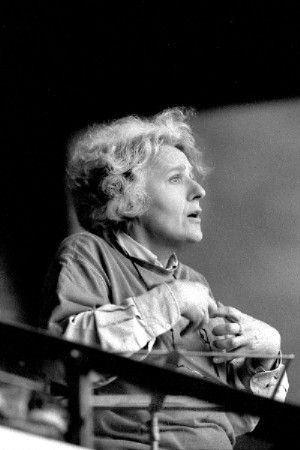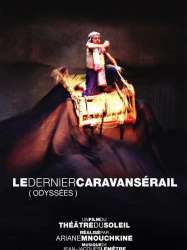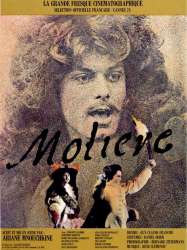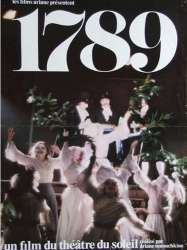Ariane Mnouchkine is a Actor, Director, Scriptwriter and Assistant Director French born on 3 march 1939 at Boulogne-Billancourt (France)

Ariane Mnouchkine (born 1939) is a world-renowned French stage director. She founded the Parisian avant-garde stage ensemble Théâtre du Soleil in 1964. She has written and directed 1789 (1974) and Molière (1978), and in 1989, she directed La Nuit Miraculeuse. She holds a Chair of Artistic Creation at the Collège de France [1], an Honorary Degree in Performing Arts from the University of Rome III, awarded in 2005 [2] and an Honorary Doctor of Letters from the University of Oxford, awarded 18 June 2008 [3].
Mnouchkine attended University in England and studied psychology before returning to her roots in theatre. She continued theatre studies at L'École Internationale de Théâtre Jacques Lecoq where in 1964 she founded Théâtre du Soleil (Theatre of the Sun) with her fellow students. The theatre collective still continues to create social and political critiques of local and world cultures.
Mnouchkine is a strong influence in modern theatre and is quoted for saying "I am in the present and only the present matters to me" on a regular basis.
Mnouchkine is a strong believer in the collaborative process of theatre. She builds her work with her company Théâtre du Soleil and has been quoted as saying "the director has already achieved the greatest degree of power he has ever had in history. And our aim is to move beyond that situation by creating a form of theatre where it will be possible for everyone to collaborate without there being directors, technicians, and so on, in the old sense." She and her company develop their works using many techniques. Sometimes, the troupe develops ideas out of improvisational exercises. They also incorporate multiple styles of theatre in their work - ranging from commedia dell'arte to various Asian rituals.
Théâtre du Soleil's productions are often performed in found spaces like barns or gymnasiums because Mnouchkine does not like being confined to a typical stage. Similarly, she feels theatre cannot be restricted with the "fourth wall". When audiences enter a Mnouchkine production, they will often find the actors preparing (putting on makeup, getting into costume) right before their eyes.
Mnouchkine has developed her own works, like the political-themed 1789, as well as numerous classical texts, like Molière's Don Juan or Tartuffe. Between 1981 and 1984, she translated and directed a series of William Shakespeare plays: Richard II, Twelfth Night, and Henry IV, Part 1. While she developed the shows one at a time, when she finished Henry IV, she toured the three together as a cycle of plays. Similarly, she developed Iphigenia by Euripides and the Oresteia (Agamemnon, Choephori, and The Eumenides) between 1990 and 1992.
While mainly a stage director, Ariane has been involved in a few movies. Her movie 1789 filmed from the live production), which dealt with the French Revolution, brought her international fame in 1974. In 1978 she wrote and directed Molière, a biography of the famous French playwright for which she received an Oscar nomination. She has also collaborated with Hélène Cixous on a number of projects including La Nuit miraculeuse and Tambours sur la digue, two made-for-television movies in 1989 and 2003 respectively. She also has writing credit for L'Homme de Rio ("The Man From Rio"), 1964.
In 1987 she was the first recipient of the Europe Theatre Prize.
On 26 May 2009 it was pronounced at an arrangement at the Ibsen Museum in Oslo by the leader of the committee, actress Liv Ullmann, that Ariane Mnouchkine was this year's winner of the International Ibsen Award. The prize will be given to her at a ceremony at the National Theatre in Oslo on 10 September 2009. Mnouchkine received the Goethe Medal in 2011.
Source : Wikidata
Ariane Mnouchkine

- Infos
- Photos
- Best films
- Family
- Characters
- Awards
Birth name Ariane Mnouchkine
Nationality France
Birth 3 march 1939 (85 years) at Boulogne-Billancourt (France)
Nationality France
Birth 3 march 1939 (85 years) at Boulogne-Billancourt (France)
Biography
Ariane Mnouchkine is the daughter of Russian film producer Alexandre Mnouchkine and Jane Hannen. She is the maternal granddaughter of British stage actor Nicholas "Beau" Hannen. Ariane is the namesake of the production company "Ariane Films" that was founded by her father.Mnouchkine attended University in England and studied psychology before returning to her roots in theatre. She continued theatre studies at L'École Internationale de Théâtre Jacques Lecoq where in 1964 she founded Théâtre du Soleil (Theatre of the Sun) with her fellow students. The theatre collective still continues to create social and political critiques of local and world cultures.
Mnouchkine is a strong influence in modern theatre and is quoted for saying "I am in the present and only the present matters to me" on a regular basis.
Mnouchkine is a strong believer in the collaborative process of theatre. She builds her work with her company Théâtre du Soleil and has been quoted as saying "the director has already achieved the greatest degree of power he has ever had in history. And our aim is to move beyond that situation by creating a form of theatre where it will be possible for everyone to collaborate without there being directors, technicians, and so on, in the old sense." She and her company develop their works using many techniques. Sometimes, the troupe develops ideas out of improvisational exercises. They also incorporate multiple styles of theatre in their work - ranging from commedia dell'arte to various Asian rituals.
Théâtre du Soleil's productions are often performed in found spaces like barns or gymnasiums because Mnouchkine does not like being confined to a typical stage. Similarly, she feels theatre cannot be restricted with the "fourth wall". When audiences enter a Mnouchkine production, they will often find the actors preparing (putting on makeup, getting into costume) right before their eyes.
Mnouchkine has developed her own works, like the political-themed 1789, as well as numerous classical texts, like Molière's Don Juan or Tartuffe. Between 1981 and 1984, she translated and directed a series of William Shakespeare plays: Richard II, Twelfth Night, and Henry IV, Part 1. While she developed the shows one at a time, when she finished Henry IV, she toured the three together as a cycle of plays. Similarly, she developed Iphigenia by Euripides and the Oresteia (Agamemnon, Choephori, and The Eumenides) between 1990 and 1992.
While mainly a stage director, Ariane has been involved in a few movies. Her movie 1789 filmed from the live production), which dealt with the French Revolution, brought her international fame in 1974. In 1978 she wrote and directed Molière, a biography of the famous French playwright for which she received an Oscar nomination. She has also collaborated with Hélène Cixous on a number of projects including La Nuit miraculeuse and Tambours sur la digue, two made-for-television movies in 1989 and 2003 respectively. She also has writing credit for L'Homme de Rio ("The Man From Rio"), 1964.
In 1987 she was the first recipient of the Europe Theatre Prize.
On 26 May 2009 it was pronounced at an arrangement at the Ibsen Museum in Oslo by the leader of the committee, actress Liv Ullmann, that Ariane Mnouchkine was this year's winner of the International Ibsen Award. The prize will be given to her at a ceremony at the National Theatre in Oslo on 10 September 2009. Mnouchkine received the Goethe Medal in 2011.
Best films
Usually with
Filmography of Ariane Mnouchkine (6 films)
Actress
Director
 , 4h28
, 4h28Directed by Ariane Mnouchkine
Themes Théâtre, Films based on plays
Rating71%





Le caravansérail est un lieu où se retrouvaient jadis les nomades d'Orient, où se croisent des histoires de migrants, réfugiés et clandestins en tous genres.

Molière (1978)
, 4h4Directed by Élie Chouraqui, Ariane Mnouchkine
Origin France
Genres Drama, Biography, Historical
Themes Films about writers, Politique, Théâtre, Political films, Films about royalty, Molière au cinéma
Actors Marie-Françoise Audollent, Roger Planchon, Philippe Caubère, Joséphine Derenne, Brigitte Catillon, Maurice Chevit
Rating75%





Jean-Baptiste Poquelin is raised by his father and his grandfather because his mother dies when he's still very little. He works as a handyman, studies the law at a university and travels the country as an actor before he becomes the celebrated playwright Molière who impresses firstly the Duke of Orleans and then even King Louis XIV.

1789 (1974)
, 2h26Directed by Ariane Mnouchkine
Origin France
Genres Drama, Documentary, Historical
Themes Théâtre, Films based on plays, Histoire de France, French Revolution films
Actors Roland Amstutz, Lucia Bensasson, Jean-Claude Bourbault, Philippe Caubère, Joséphine Derenne, Louba Guertchikoff
Rating71%





Au lendemain de la fusillade du Champ-de-Mars du 17 juillet 1791, des bateleurs entreprennent de jouer les principaux événements des deux années qui viennent de s’écouler : de la réunion des États généraux à la proclamation de la loi martiale, en passant par la prise de la Bastille, la Grande Peur, et la nuit du 4 août. Dans une grande liesse populaire, ils tentent de montrer le détournement des espoirs, l’explosion de la joie puis l’effondrement du rêve d’égalité des droits. Pour ce faire, les bateleurs utilisent toutes les formes théâtrales, de la pantomime à la tragédie, des marionnettes à l’opéra-bouffe. Ils représentent ainsi les personnages importants ou humbles de cette année décisive et prennent à leur compte la phrase de Saint-Just : « La révolution doit s’arrêter à la perfection du bonheur.
Scriptwriter

Molière (1978)
, 4h4Directed by Élie Chouraqui, Ariane Mnouchkine
Origin France
Genres Drama, Biography, Historical
Themes Films about writers, Politique, Théâtre, Political films, Films about royalty, Molière au cinéma
Actors Marie-Françoise Audollent, Roger Planchon, Philippe Caubère, Joséphine Derenne, Brigitte Catillon, Maurice Chevit
Roles Writer
Rating75%





Jean-Baptiste Poquelin is raised by his father and his grandfather because his mother dies when he's still very little. He works as a handyman, studies the law at a university and travels the country as an actor before he becomes the celebrated playwright Molière who impresses firstly the Duke of Orleans and then even King Louis XIV.

1789 (1974)
, 2h26Directed by Ariane Mnouchkine
Origin France
Genres Drama, Documentary, Historical
Themes Théâtre, Films based on plays, Histoire de France, French Revolution films
Actors Roland Amstutz, Lucia Bensasson, Jean-Claude Bourbault, Philippe Caubère, Joséphine Derenne, Louba Guertchikoff
Roles Writer
Rating71%





Au lendemain de la fusillade du Champ-de-Mars du 17 juillet 1791, des bateleurs entreprennent de jouer les principaux événements des deux années qui viennent de s’écouler : de la réunion des États généraux à la proclamation de la loi martiale, en passant par la prise de la Bastille, la Grande Peur, et la nuit du 4 août. Dans une grande liesse populaire, ils tentent de montrer le détournement des espoirs, l’explosion de la joie puis l’effondrement du rêve d’égalité des droits. Pour ce faire, les bateleurs utilisent toutes les formes théâtrales, de la pantomime à la tragédie, des marionnettes à l’opéra-bouffe. Ils représentent ainsi les personnages importants ou humbles de cette année décisive et prennent à leur compte la phrase de Saint-Just : « La révolution doit s’arrêter à la perfection du bonheur.

That Man from Rio (1964)
, 1h50Directed by Jean-Paul Rappeneau, Philippe de Broca
Origin France
Genres Comedy, Action, Adventure, Crime
Themes Spy films, Transport films, Road movies, Chase films
Actors Jean-Paul Belmondo, Françoise Dorléac, Jean Servais, Adolfo Celi, Simone Renant, Daniel Ceccaldi
Roles Writer
Rating70%





As airman Adrien Dufourquet embarks on an 8-day leave in Paris to see his fiancée, Agnès, two South American Indians steal an Amazon statuette from a museum and force Professor Catalan, the curator, into their car. Catalan was Agnès' father's companion on an Amazon expedition during which her father died. Catalan believes that the statuette is one of three which hold the secret to an Amazon treasure. Adrien arrives in time to see the Indians abducting Agnès, the only one who knows the location of the other statuettes, and he pursues them to the airport where he steals a ticket and boards the same plane.
Direction

My Son, the Hero (1962)
, 1h55Directed by Duccio Tessari
Origin Italie
Genres Fantastic, Fantasy, Action, Adventure, Peplum
Themes Seafaring films, Films based on mythology, Transport films, Films based on Greco-Roman mythology, Dans la Grèce mythologique, Films based on Greco-Roman mythology
Actors Giuliano Gemma, Jacqueline Sassard, Pedro Armendáriz, Antonella Lualdi, Fernando Rey, Gérard Séty
Roles First Assistant Director
Rating60%





The king of Crete, Cadmos, has just murdered his wife in order to live with his scheming lover Ermione. For this deed, a prophetess curses him in the name of the gods, foretelling him that the man his infant daughter Antiope would one day fall in love with will eventually be his doom. Furious at the gods' judgement and unable to kill Antiope on the spot (lest the curse would fulfill itself immediately), megalomanic Cadmos renounces the gods and proclaims himself one. To this end, he and Ermione undergo a treatment with mystical vapors which render their bodies invulnerable (save for one critical spot on Ermione's chest uncautiously left covered).
 Connection
Connection

